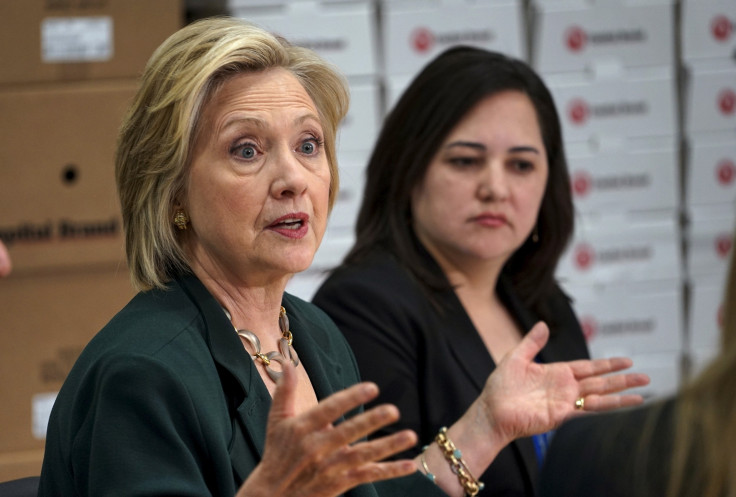
Hillary Clinton came under fire this week when she “lied” about her grandparent’s immigration history during an unscripted conversation at a campaign event in Iowa. She was “wrong,” may have “fudged the truth” and was called a liar, many, many times. According to documents release by Buzzfeed, Hillary was incorrect when she said that “all” of her grandparents “came over here.” In fact, most of her grandparents were born in the U.S. Yet in the context of the current immigration debate, Hillary’s inaccurate statement is not likely to be considered a “whopper” by many. That’s because Clinton’s comments were about immigration reform policy in general, and specifically about keeping immigrant families together and making it legally easier for them to live and work in the U.S. Here is what she said, with context.
“We are turning down people who really want to work. I mean, they are here to work. And a lot of them now have children who are American citizens and they are doing the best they can to try to make a good life for themselves and their families. And you know, I think if we were to just go around this room, there are a lot of immigrant stories. All my grandparents, you know, came over here and you know my grandfather went to work in a lace mill in Scranton, Pennsylvania and worked there until he retired at 65,” Clinton said in a discussion with voters at Capital City Fruit, in Norfolk, Iowa.
Clinton is speaking about the millions of undocumented migrants currently in the U.S. who “have children who are American citizens.” It’s not really important to her argument whether or not it was her grandparents or great-grandparents who “came over.” What’s important is that she’s pointing out that everyone has immigrant heritage, and that as far as she knows, life was a lot easier for them legally than it is for today’s immigrants.
“So I sit here and I think, well, you’re talking about the second, third generation,” Clinton continued saying. “That’s me, that’s you. And we are saying to all these other people who want the same dreams and the same aspirations and the willingness to work hard just like our families did that no, we’re not going to make it easy for you, we’re not going to make it legal for you. And I just think that’s such a short term, unfortunate outcome [....]”
Correct her statement to “my ancestors” or “one of my grandparents,” and the argument doesn’t really change. She’s still the descendant of immigrants, and the heir of a privileged class of European transplants that didn’t have to fight as much to fit into the fold of American society. It’s telling that of the half-dozen articles I’ve read about this gaff, not one writer, not even among the more conservative blogs, has linked her inaccuracy to some sort of contradiction to her argument for legalizing immigrants that broke immigration rules.
“She’s trying to create a narrative... her narrative might be hers but it might not indeed be the truth,” Elisabeth Hasselbeck said of Clinton’s gaff, on the Fox News program “Fox and Friends.”
However, Clinton’s gaff wasn’t as debilitating as, for example, Florida Senator Marco Rubio’s story about his “exile” parents who allegedly fled the Castro regime. I wrote about this at length in a recent article about his Presidential campaign announcement at Freedom Tower, the Cuban-refugee equivalent of Ellis Island. Rubio’s narrative played a major rhetorical part in his views about immigration and foreign policy. As “refugees,” Rubio’s Cuban parents were allegedly fleeing oppression, which sounds more noble than the normal case; seeking economic opportunity. The story built his credentials as an ardent anti-communist, and bolstered his arguments for opposing diplomatic ties with Cuba. He said at least once that the Castro regime took his parents’ country away from them. His claims were not only false -- his parents left Cuba well before the Castros came to power -- but directly severed his alleged personal connection to his policy points. Correct the facts, and his arguments don’t make as much sense. For example, Rubio is opposed to family-based visas, but his own parents wouldn’t make it to the U.S. under his proposed “merit-based” immigration system.
We all have myths about our parent’s immigration histories. For instance, I learned only a few years ago that my Italian father’s first language was Spanish. I only figured it out because of a conversation I had in Zurich with my Italian aunt (she emigrated to Switzerland), who lived with him in Rome in the 1960s. It’s confusing, and I’m not the only one that’s confused about his family history. Even Brian Kilmeade of the “Fox & Friends” appeared sympathetic with Clinton’s gaff. (This was originally pointed out by Media Matters, a left-leaning blog closely linked to Hillary’s PACs).
“I will defend her on this. I mean, the other day, when Heritage.com came in here, I did not know if my grandmother and grandfather were born here or not, because they came over on the boat.... But they did have the immigrant experience.... If you've just come over as opposed to, you weren't over yet, is it that big a deal?” Kilmeade said.
© 2024 Latin Times. All rights reserved. Do not reproduce without permission.